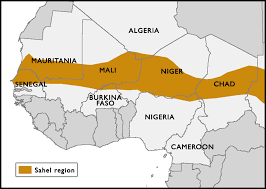Abdallah Ould Mhamedi, a specialist in African affairs, makes a review of Mauritanian President Ghazouani’s first four years in power.
In the Chinese city of Chengdu, Mauritanian President Mohamed Ould Cheikh El Ghazouani attended the opening of the 31st summer session of the World University Games last week. At the same time, he closely followed developments in the Sahel region. A military coup in Niger has exacerbated the already difficult situation in the region, which has been hit by extremism, terrorism and organized crime, as well as smuggling and illegal immigration. This situation is exacerbated by a long history of political violence, poverty, marginalization and
injustice.
Ould Cheikh El Ghazouani is closely monitoring the situation in the Sahel, not only as President of Mauritania, the last bastion of calm and stability in the region, but also as the rotating President of the Group of Five Sahel countries (G5S). He is the only elected president among the group’s leaders, given the unconstitutional situations in Mali, Burkina Faso, Chad and currently Niger.
It is undeniable that recent events in the region have taken up a significant part of his time, spent in the company of Chinese President Xi Jinping. Together, they analyzed the complex issues facing the region, which has suffered the consequences of wars linked to terrorism and power struggles through coups d’état and counter-coups d’état. The region has now become a merciless battleground on the international stage.
Mauritania lies at the entrance to the desert strip stretching from Nouakchott to Darfur. This area, known as the Sahel belt, is home to terrorist groups of varying identities, making the situation complex. Among these groups, “Daesh” is seeking to establish emirates in the Great Sahara and West Africa, while the “Al-Qaeda” organization is
seeking to expand in the region through regional branches, notably the “Al-Qaeda Organization in the Islamic Maghreb.” At the same time, the Wagner group is gradually establishing bases in the region, from the
Central African Republic to Mali and Burkina Faso, with the creation of local militias supported by governments.
Despite these challenges, Mohamed Ould Cheikh El Ghazouani led Mauritania for four years, a period marked by the Covid-19 pandemic and unrest in Ukraine. Mauritania could have played a central role in resolving regional crises had it not been for the ambitions of former president Mohamed Ould Abdelaziz, who is currently under house arrest and facing legal proceedings.
Nevertheless, under the presidency of El Ghazouani, Mauritania has maintained a climate of stability and political harmony. This has made it a strategic partner for many countries, including NATO, which has described Mauritania as a “strategic partner” and strengthened security cooperation ties. Mauritania has become a popular destination for Western military and security delegations, recognizing the role of the Mauritanian army in the fight against terrorism and organized crime.
The military and security strategy put in place by the current President, who held key positions in the armed forces before becoming Head of State, has made it possible to control the attacks that rocked the country in the first decade of this millennium. Mauritania, alongside Chad, is now considered a key player in the fight against
terrorism in the Sahel.
However, having an effective military force is not enough in such a complex region. The coup d’état in Niger has brought the region to the brink of explosion, highlighting the stakes for the sponsor countries of the five Sahel countries. Although the G5 Sahel has experienced political dissension, Mauritania and Chad, as members of the group, continue to work to curb the spread of terrorism and coups d’état threatening the stability of the states.
From the outset, the plan of Ould Cheikh El Ghazouani, who heads the Group of Five in the Sahel, was clear: he aimed to unite the countries of the group by encouraging the return of Mali and playing a role of resistance during the blockade imposed on that country in 2021. It has also made considerable efforts by working closely with Mali and opening the port of Nouakchott to supply markets with products and foodstuffs, after West African ports were closed to it.
This is the dynamic that Ould Cheikh El Ghazouani and Mauritania have built on over the last four years. Their approach is based on political stability through consultation with all parties, without exception. In addition, social programs have been put in place to support marginalized groups and alleviate the impact of the global economic crisis. At the same time, efforts have been made to improve infrastructure in a country that has long suffered from prevarication and nepotism.
President Ould Cheikh El Ghazouani has succeeded in putting an end to the anger and tension in Mauritania. Thanks to his efforts, he has calmed spirits and helped to bring serenity to the country.
HA/fss/abj/APA


